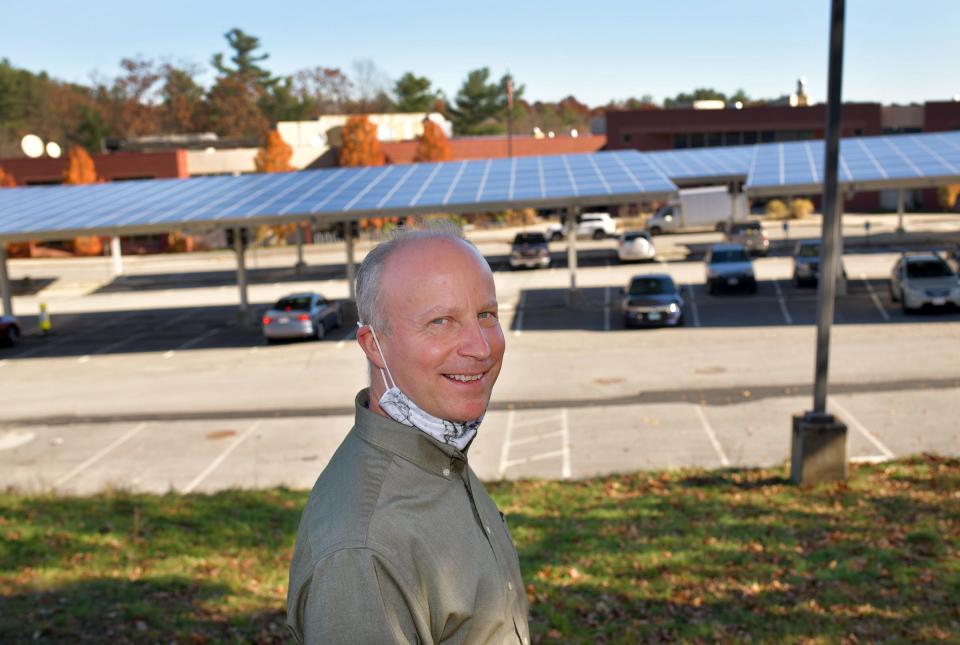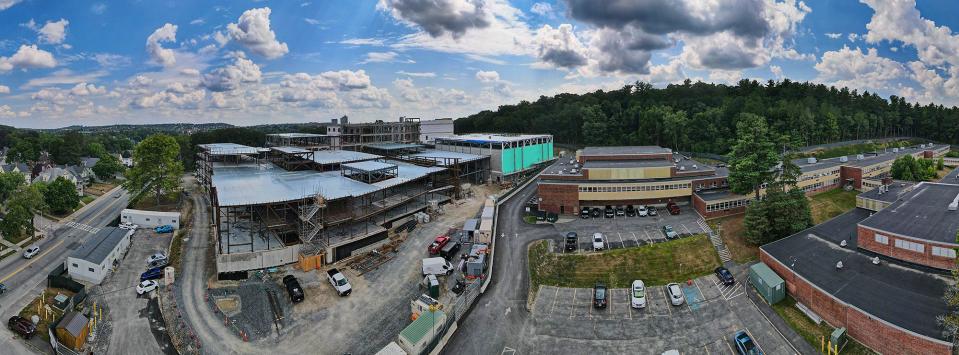Worcester moves away from fossil fuel ban; some climate activists disagree
WORCESTER – Some climate activists are disappointed with what appears to be a decision by the city administration not to make an attempt to become one of 10 cities and towns in Massachusetts to ban fossil fuels in some buildings.
John Odell, the city’s chief sustainability officer, told the Green Worcester Advisory Committee Monday night, "We think there’s a better option (for Worcester)," instead of an outright ban on fossil fuels in new construction and major renovation projects.
Odell told the committee the city administration will wait for the state’s updated stretch building code before it decides how it wants to proceed.
It’s anticipated the updated code will give communities the option to ban fossil fuels in new construction and major rehabilitation projects as the state moves toward its goal of achieving net zero greenhouse gas emissions by 2050.
The state Department of Energy Resources is expected to issue the final stretch code in December.

"We don’t have all the answers now,” said Odell during Monday night’s meeting. “This is something, we as a department and administration as a whole, are well aware of, and we’re actively moving forward to put together a plan that actually works.”
Boston vote
Odell’s comments came less than a week after the Boston City Council voted 9-3 to submit a home rule petition to state lawmakers to become one of the 10 communities to restrict fossil fuels in new construction and major renovation projects.
The 10 city/town ban is a pilot program spelled out in the climate energy bill signed into law last month by Gov. Charlie Baker.
Any community that wants to be in the top 10 must submit a home rule petition to state lawmakers for approval.
If the green light is given, then each of the ten communities can adopt a local ordinance to ban fossil fuels in new construction and major renovation projects.
Disappointed
“I’m obviously disappointed the city is going slowly,” said David Coyne, a member of an interfaith group called Worcester Congregations for Climate and Environmental Justice.
Coyne tied his disappointment to Boston approving a petition roughly one month after Mayor Michelle Wu said she wanted it done.
Feeling that Worcester leaders don't share Boston’s sense of urgency to fight climate change, Coyne that it’s not up to city administration to decide on a petition.
That is up to the city council, and Coyne said that while activists are having discussions about the possibility of calling on the council to support a petition, Odell’s comments likely mean such a move could take a little longer.
"We need six councilors to support the position, and it’s harder to do if city administration is pressing councilors not to vote on a home rule petition, said Coyne
“We remain optimistic to get the city administration and city council to move forward. It may be more of an uphill climb and take longer than we’re hoping.”
No time to waste
"Personally, I would put our hat in the ring right away (for a home rule petition), only because there’s no time to waste to address climate change,” said Paul Popinchalk, a member of 350 Central Mass, a grassroots climate-action organization that is affiliated with 350.org.
Odell is being cautious and his comments make sense, Popoinchalk said, but it’s up to the city manager to decide how Worcester fights climate change.
Acting City Manager Eric D. Batista’s views on the environment are unknown, Popinchalk said, adding there is a silver lining to all of this — the few months before the updated stretch code is released to educate the city council and residents on the importance of combating climate change.
As for when – or if – climate activists will call on the city council to vote on a petition, Popinchalk said it could take a few months, and activists will work with District 5 City Councilor Etel Haxhiaj to, “get her sense of the layout of the land.”
Haxhiaj previously stated she supports a petition and said activists have to get the ball rolling by coming to the council to ask for a vote.
Calls and an email to Haxhiaj that requested comment were not returned.

Pillars
Odell's comments to the Green Worcester Advisory Committee included “pillars” that will be the city’s foundation to make the transition to clean energy.
They include working with National Grid, the city’s electricity supplier, on issues like beefing up the public utility’s power grid in Worcester.
Another is working closely with real estate developers, including organizations like the Worcester Regional Chamber of Commerce and the Worcester Business Development Corporation, to get a handle on how the energy transition impacts this sector.
A “critical” piece, said Odell, is educating the public about the intricacies of the transition including challenges, benefits and how it relates to their lives.
“People are concerned about their utility bill. Beyond that, they have the rest of their lives to live, and this is not front and center," said Odell. “This is a herculean effort. It affects everybody. Residents need to be knowledgeable enough to make good decisions about their own heating systems and be climate savvy.”
Finally, there are costs of making change, but the negatives of not taking action could far outweigh them.
"People often look at the costs of making change, but never the costs of not making change, which is harder to define," said Odell. “As important as implementation costs are, in this case I would argue the costs of not making change are more (damaging).”
One pillar is problematic
One Worcester climate activist takes issue with one of the pillars.
Gaylen Moore is the coordinator of the Worcester chapter of Mothers Out Front, a volunteer organization that supports a swift transition from fossil fuels to renewable energy.
While Odell’s comments indicated the city will work with National Grid, Moore said the public utility raked in record profits this year on the backs of ratepayers who were forced to choose between paying their utility bills and feeding their families.
The utility, according to Moore, has known for some time that it needs to upgrade its power grid in Worcester, plus meet state regulations to cut carbon emissions.
Moore worries residents will be hit with higher utility bills to pay for grid upgrades.
“National Grid representatives telling city officials that making long-overdue upgrades to the grid will force it to raise rates on residents is a disgusting tactic, and the city needs to stand up for its residents and push back,” stated Moore in an email to the Telegram & Gazette.
During Monday night’s meeting, Odell mentioned that National Grid is committed to the state’s plan to achieve net zero by 2050 by investing $5 billion in the effort. And, the city is committed to working with the utility to get it done.
Additionally, Odell highlighted green energy systems in the new Doherty Memorial High School, currently under construction, that proves the city is making strides to move from fossil fuels to renewable systems.
Time to work together
Moore declined to respond directly to Odell’s comments that the city administration preferred to wait for the updated stretch code instead of backing a fossil fuel ban for some buildings.
But she said there is room for the city and activists to work together.
“I think there are shared goals between city and climate activists in the city, and we’re committed to working together to understand and explore different pathways to meet those goals,” she said.
When asked if activists will present a home rule petition to city councilors, Moore said, “Conversations are ongoing, and a home rule petition is one of several possible pathways to achieve our climate goals.”
Contact Henry Schwan at henry.schwan@telegram.com. Follow him on Twitter @henrytelegram
This article originally appeared on Telegram & Gazette: fossil fuels renewable energy climate change Boston global warming

